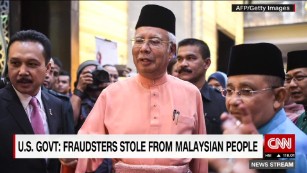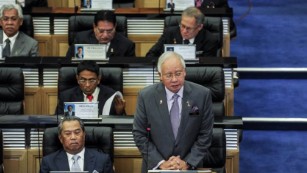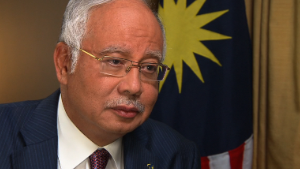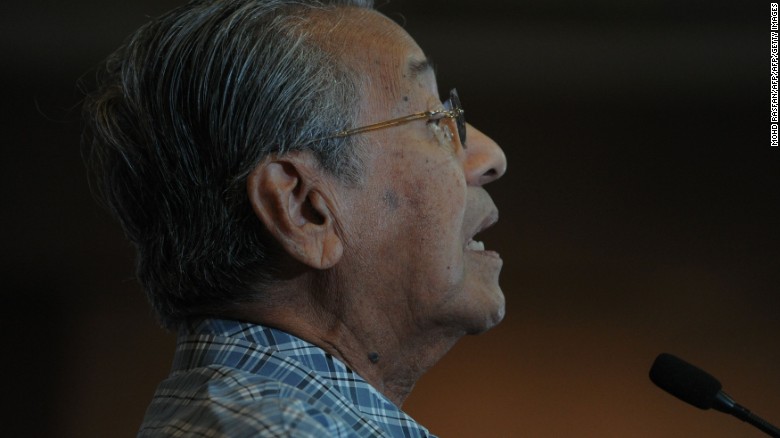Former Malaysian PM Mahathir throws weight behind rally to oust leader Najib
Malaysia's former prime minister has appeared in an online video urging opponents of the current leader to take to the streets to demand his ouster.
Mahathir Mohamad, who oversaw a brutal repression of opposition protests while the country's prime minister from 1981 to 2003, called on supporters of the civil and electoral rights group Bersih to join a mass rally Saturday to demand current Prime Minister Najib Razak step down.

U.S. government: Billions stolen from Malaysian fund
Characterizing Malaysia as being in a "state of emergency," Mahathir accused Najib's administration of creating debts "to the tune of billions of ringgit which the government and country cannot repay."
A billion ringgit is equal to around $230 million.
Wearing a yellow Bersih 5 t-shirt, the nonagenarian -- Malaysia's longest-serving leader -- urged his former constituents to join the demonstration, "because (Bersih) are trying to find ways to heal our nation by forcing a change in government, so we are not led by somebody who has been accused of the whole world of being behind the disappearance of so much money.
"I hope all Malaysians will give their full support and take part in this Bersih protest."
Malaysia: Crackdown on free speech creates 'culture of fear'
Anti-government coalition

Malaysia's $3.5 billion scandal will not go away
Bersih is the common name for a coalition of Malaysian NGOs, which seeks to clean up the country's electoral process. "Bersih" means "clean" in Malay. "Bersih 5" refers to the fifth phase of street protests organized by the group.
Widespread dissatisfaction with Najib's administration -- most notably over alleged financial mismanagement, to the tune of billions of dollars, of a government-run fund called 1MDB -- has driven many Malaysians into the arms of the Bersih coalition.
Najib told Bernama, Malaysia's state media that the time for the people to exercise their voice was at the next general election, due to be held by 2018.
"The best time to decide is when the time comes. There will be an election and people can make their choice and we will abide by the decision of the rakyat (people). And that's important," he said.
Malaysia reaches 'significant' defense deal with China, takes shot at West
Significant meeting

Full interview: Malaysian Prime Minister
The demonstration is unlikely to have a direct impact, but more likely be an "important incremental part of creating" an anti-Najib social coalition, according to Wong Chin Huat, a Fellow at the Penang Institute.
Saturday's protests may not be as large as previous Bersih demonstrations, Wong says, but will be more diverse, indicating a shift in the group's appeal.
"Bersih will play a role as a platform for forces demanding change," he told CNN.
Mahathir's involvement in the opposition has raised eyebrows amongst Malaysians, given that it represents a significant u-turn from his previous hardline position, when in government, on protests.
The then-Prime Minister clamped down on the "Reformasi" movement sparked by the removal and subsequent jailing of his Deputy Prime Minister, Anwar Ibrahim. The government's response to protests in the late 90s and early 2000s was brutal, which makes Mahathir's embrace of the current popular movement a surreal experience for many Malaysians.
"I don't think he's sincerely converted himself but he's very pragmatic," Wong says.
"What you are seeing is a change of circumstance, so much so, that a lot of people who may be ideologically opposed to ideas are now embracing them."
He says the former prime minister is expected to take part in Saturday's rallies, which will be country-wide. Smaller protests are planned in as many as 57 other cities worldwide by Malaysians living abroad.
Pro-government agitators
Some watchers are concerned that the so-called "red shirt brigade," a group of Malay-Muslim extremists, who are tacitly supported by the government, could possibly mobilize to turn this protest chaotic.
Najib says he wants pro- and anti-government groups to avoid confrontation.
"If one side wants to protest and the side that wants to protect the government is compelled to come out ... but I don't want any physical clash," he told Bernama.
The Red Shirts leader, Jamal Yunos, is a controversial figure in the country. A photo of him -- wearing his red shirt -- posing with three young men wearing yellow Bersih t-shirts led local media to believe that he is planning to infiltrate provocateurs into the rally.
In October, Bersih chairperson Maria Chin Abdullah said that Red Shirts led by Jamal Yunos had assaulted two Bersih supporters.
"In particular, a Bersih supporter was physically beaten up by these group of thugs," she said in a statement at the time. "The gangsters egged him, pulled him off his bike, kicked and punched him with such force that it injured him badly. They could have killed him."
Wong believes bloodshed by the group would ultimately be counterproductive and turn more Malaysians towards the Bersih coalition.
"I don't think they will have a huge impact," he says. "They have helped Bersih to get more attention, (and) in many places have caused the police to behave more professionally (when dealing with protestors) than in the past."
News Courtesy: www.cnn.com











